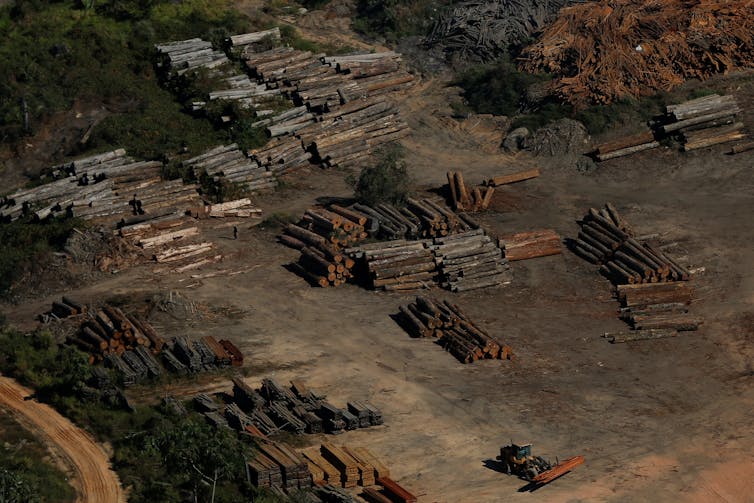Australia might water down illegal logging laws – here's why it's a bad idea
- Written by Beatriz Garcia, Lecturer, Western Sydney University
Illegal logging is an immensely profitable global activity, linked to corruption, human rights abuses, criminal networks, and environmental destruction. A 2017 study by the Global Financial Integrity ranked illegal logging as the third largest global crime in value, after counterfeiting and drug trafficking.
Australia imports roughly A$8.1 billion worth of timber products a year, and according to estimates from the Department of Agriculture and Water Resources, up to A$800 million comes from sources with some risk of being illegally logged.
Read more: Organised crime, illegal timber and Australia’s role in deforestation
Yet the federal government is currently considering significantly weakening regulation that prevent the import of illegal timber. Companies will be less likely to know where their wood comes from, and consumers will have less assurance that they are buying products from a legitimate source.
The proposed reform will require amendments to the 2012 Illegal Logging Prohibition Regulation. Once the changes are introduced, the parliament has 15 sitting days to disallow the changes.
Major change
The Department of Agriculture and Water Resources has proposed significant changes to our timber import rules, with the aim of reducing the costs for businesses to comply with regulations.
Under current laws, businesses need to assess and manage the risk that imported timber or wood products may have been illegally logged. This is known as “due diligence”, and applies to timber imports worth A$1,000 or more.
Read more: Lessons from the US: stopping illegal logging benefits both sides of politics
 Piles of wood seen during ‘Operation Green Wave’, which combats illegal logging in Apui, in the southern region of the state of Amazonas, Brazil.
REUTERS/Bruno Kelly
Piles of wood seen during ‘Operation Green Wave’, which combats illegal logging in Apui, in the southern region of the state of Amazonas, Brazil.
REUTERS/Bruno Kelly
The “deemed to comply” provisions assume that an importer has complied with the regulations, in some cases without actual checks and proofs of legality. This will exempt companies from undertaking their own due diligence.
But the Australian government recognises that third-party companies, who certify timber is legally logged for Australian companies, face challenges in dealing with deliberate fraudulent activity. Given the prevalence of bribery in illegal logging, it is not uncommon for illegally logged timber to have the “correct” government documents and achieve certification.
This problem is recognised in the European Union, which advises that regulations take into account the risk of corruption, saying that “even official documents issued by authorities cannot be considered reliable”.
Neither the EU or US regulations recognise third-party certification systems as a means of assuring timber legality (only as part of a system of due diligence or due care).
When it comes to illegal logging, due diligence works
Illegal logging degrades forests, harms wildlife, and emits greenhouse gases. The land sector, including logging, deforestation and other activities, accounts for 24% of total global emissions.
As well as causing environmental harm, illegal logging involves human rights abuses like violence against local communities, forced labour, and pollution of vital water supplies.
Read more: CSI trees: how forensic science is helping combat illegal logging
This is why developed countries around the world have created timber import standards, which play a key role in curbing illegal logging.
Experience in Europe shows that enforcing illegal logging laws and due diligence requirements has a significant positive impact. The more European authorities enforce these measures, the more aware and compliant the industry becomes. Companies change their supply chains as a result of due diligence processes, which in turn has an immediate impact in the countries that supply the timber.
In contrast, countries with inactive or inefficient enforcement see uncertainty within the industry and lower levels of awareness.
Watering down Australia’s due diligence requirements fly in the face of this evidence. While the proposed change is designed to make it cheaper and easier for companies to comply with the law, there’s a real chance it will increase the trade of illegal timber. Businesses will have fewer incentives to make sound decisions and consumers will not be able to tell if the timber they consume is indeed legally sourced.
Any changes to our laws should strengthen them, not water down their requirements and limit their value and effectiveness. Our current legislation is the best defence for consumers and businesses. It should be enforced to ensure that the wood imported and sold in Australia does not cause harm both to people and nature.
Authors: Beatriz Garcia, Lecturer, Western Sydney University




